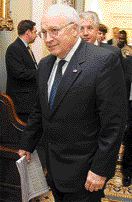Untitled Document
 |
U.S. Vice-President Dick Cheney
is Alberta bound, Premier Ralph Klein says. |
U.S. Vice-President Dick Cheney is to jet into Alberta next month for an oilsands
tour, further cementing the vital role Canada will play in supplying crude to
the world's biggest energy consumer.
Premier Ralph Klein surprised his aides Friday by revealing at the premiers
meeting in Banff that U.S. President George W. Bush's right-hand man would arrive
in September for a primer on the multibillion-dollar oilsands projects in northeastern
Alberta.
It came as Klein reiterated Alberta's oilpatch shouldn't be used as a bargaining
chip in an increasingly bitter trade dispute with the United States over softwood
lumber.
The news came the same day crude oil prices closed at a dizzying $66.86 US
a barrel in New York.
"Vice-President Cheney will be visiting Alberta in early September to
look at the tarsands and there's just a tremendous amount of interest now in
seeking that secure and reliable supply of oil and gas -- and of course they're
looking to Canada and in particular Alberta," Klein said.
"But relative to using that as a tool to force the Americans to the table
relative to softwood lumber," Klein continued, "if we start to use
measures that are deemed to be vindictive, then that only creates vindictiveness
on the other side and it starts to escalate."
Klein's remarks may disappoint Canadians linked to the lumber industry, but
oilpatch officials welcomed Klein's comments on both fronts.
Cheney's visit indicates the oilsands have arrived as a recognized global energy
source and "not some interesting science experiment in the backwoods of
Alberta," said Pierre Alvarez, president of the Canadian Association of
Petroleum Producers.
"It is a proven, reliable, high-tech industry that's poised to make an
important contribution to the North American energy scene," Alvarez said.
Interest in Canada's oilpatch continues to grow as the demand for fresh crude
supplies becomes more intense. Political uncertainty in oil producing hot spots
around the world has made Canada's oil and gas supplies even more attractive
to the United States and other countries.
China has also been eyeing the Canadian oilpatch -- a point not lost on Washington.
Canada is the largest supplier of oil to the U.S. and major American petroleum
producers have made big investments in their northern neighbour.
Alberta's oilsands are also viewed as a major piece of the puzzle in meeting
North America's energy demands.
Oilsands production exceeded one million barrels a day this year, but that
figure is expected to strike 2.7 million barrels daily by 2015. The United States,
meanwhile, consumes about 20 million barrels of oil a day. Cheney's visit is
"recognition of the role Fort McMurray and northeast Alberta is going to
be playing in the future supply of the United States and Canada," noted
longtime oilpatch observer Ian Doig, of Doig's Digest.
A tour by Cheney, who visited Calgary during the World Petroleum Congress in
2000 before he became vice-president, was rumoured for months before Klein made
his remarks. Officials in the premier's office would not release further details.
The growing importance of the energy sector was further recognized at the premiers'
conference where 13 provincial and territorial leaders agreed to develop a Council
of the Federation Energy Strategy.
As part of the effort, Newfoundland and Labrador Premier Danny Williams will
chair a premiers council committee on energy that will work with provincial
and territorial energy ministers to examine energy issues and consult with industry.
The ultimate aim is for the provinces and territories to take a leadership
role in developing energy policies in Canada.
The committee will look at the potential of all viable energy sources -- including
nuclear -- to meet growing demand, improving transmission and distribution systems,
and ways for technology to reduce emissions.
All premiers are to look at the committee's conclusions in a report at their
next meeting.
"The federal government must engage constructively with provincial and
territorial energy ministers on provincial and territorial participation in
international energy discussions and negotiations," Klein said.

